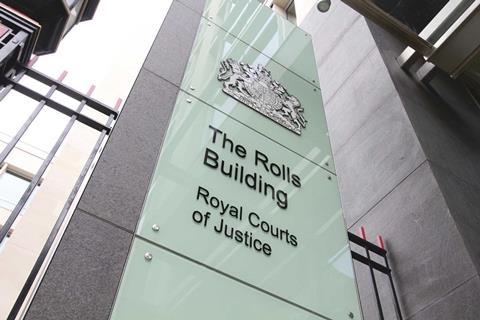A leading tax silk accused of giving negligent advice about film financing schemes has told the High Court that he ‘did not make any mistakes’ and emphasised that the law and practice have changed since he advised on the schemes nearly two decades ago.
More than 100 investors are suing Andrew Thornhill QC, 78, over his advice that three materially identical schemes, which were advertised in the early 2000s, would provide tax benefits. The schemes were later shut down by HM Revenue & Customs causing ‘dire financial consequences’ for investors, many of whom settled with HMRC, the court has previously heard.
Thornhill, who was called to the bar in 1969, ‘gave unequivocal and unqualified advice in writing that statements provided to prospective investors about the availability of tax relief were correct’, the claimants’ barrister Anneliese Day QC told the court earlier this month.
Ten claimants – who between them invested more than £3m in the schemes – are having their cases tried as sample claims as investors try and recover their losses from Thornhill, who is said to have advised that there was ‘no doubt’ the proposed businesses would be trading.
As his cross-examination began today, Day asked Thornhill: ‘Do you think that you made any mistakes here?’ Thornhill replied: ‘I would say that, by the standards of 2002/2003 and the law as it then stood, I did not make any mistakes in my original advice.
'However, were one to start afresh in 2021 and address the same questions as one had to address in 2002/2003, although I believe I would have arrived at the same answer, the process by which I would have arrived at the same answer would have been very different.'

He added that, following a series of court rulings on film partnership schemes, there had been ‘a major sea change, first of all in practice and then in the law’ and that such schemes now required a ‘more detailed factual analysis’.
Day asked if Thornhill ‘would still say there was “no doubt” that the schemes were trading’, to which he replied: ‘I would conclude there was trading. I am not necessarily sure I would say “no doubt” because any conclusion that you reach now … would have to be based on detailed factual evaluations.’
‘I believe I would still have come, on the basis of the facts as I understand them, to the same answer but it would have been expressed at rather greater length,’ Thornhill added.
In his written evidence, Thornhill said he thought the decision by some members of the scheme to accept a settlement offer from HMRC was wrong. ‘Before my involvement ceased, I felt that the case challenging HMRC’s decision to deny the members tax relief was strong, and had it progressed through the tribunal system and the courts, I do believe that HMRC would have lost,’ he said.
The trial before Mr Justice Zacaroli continues.


























